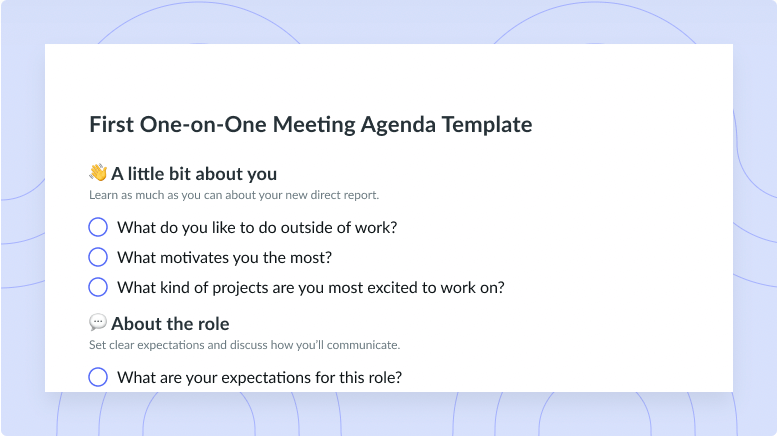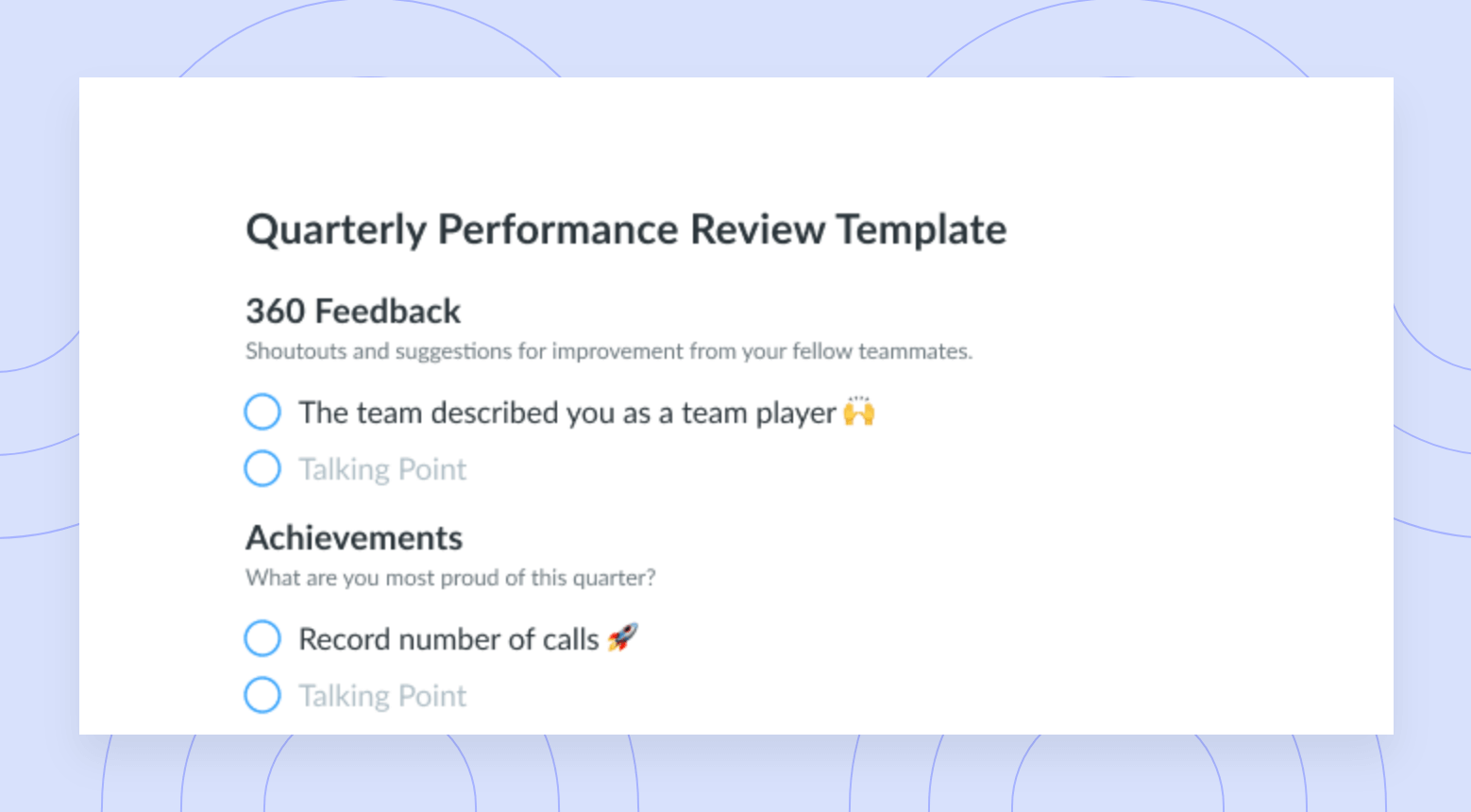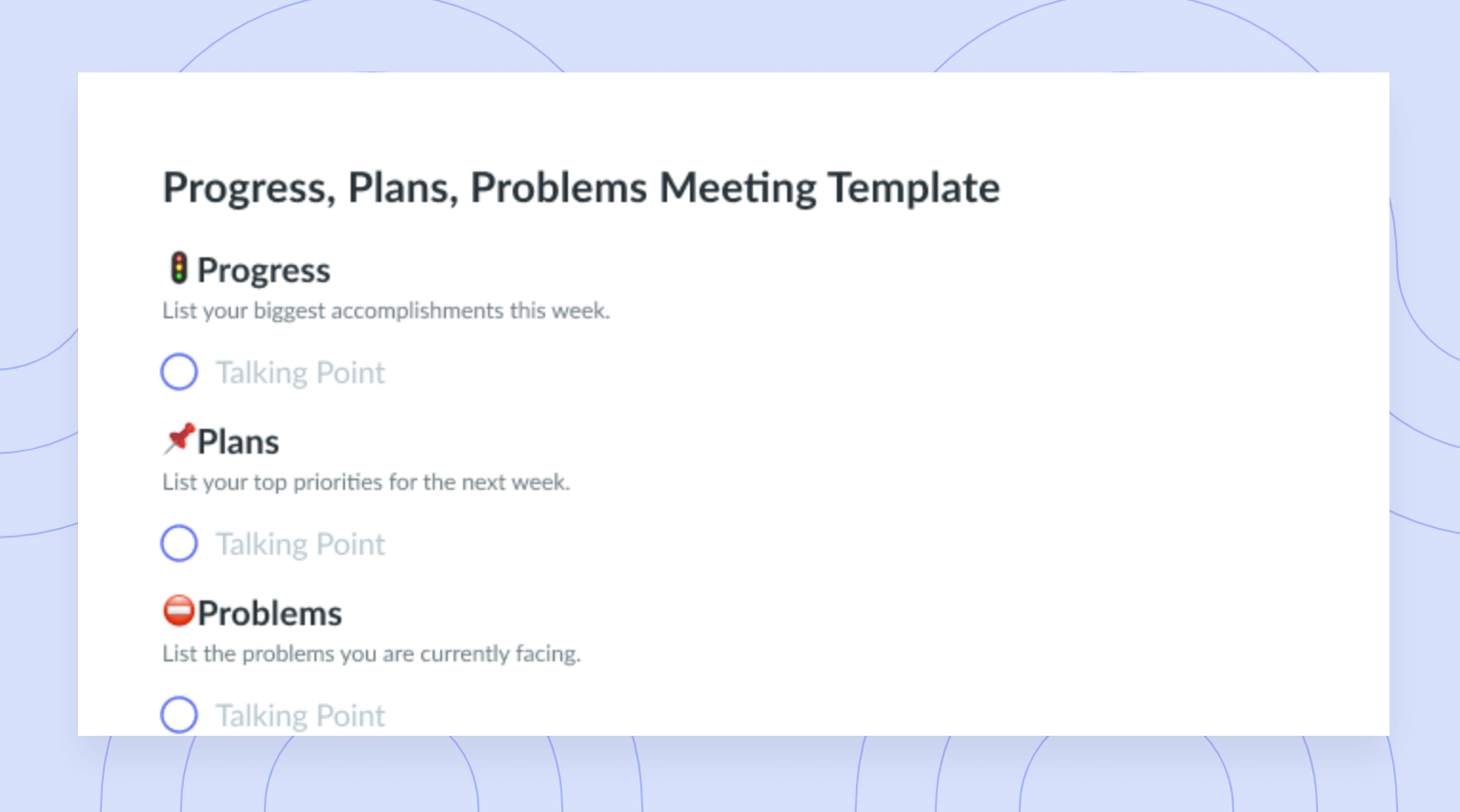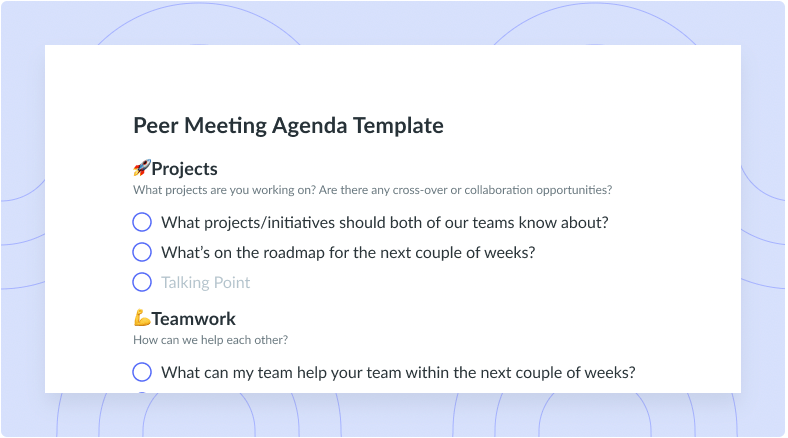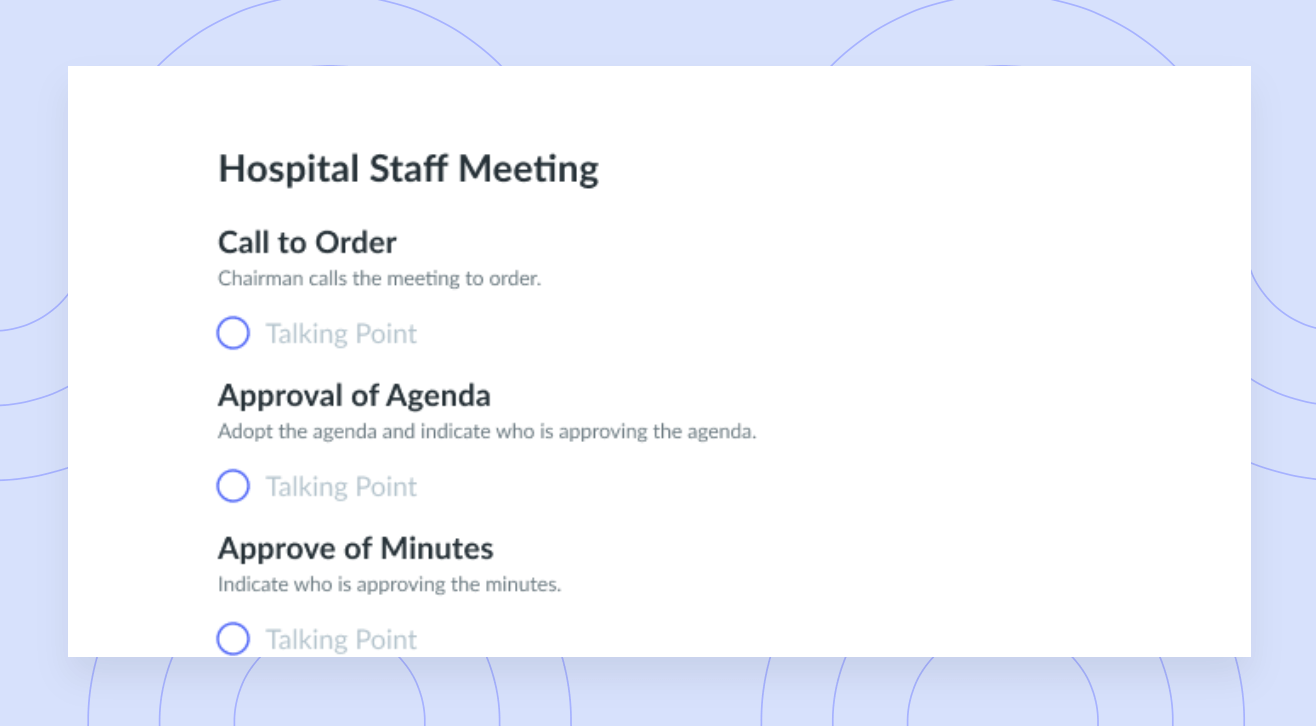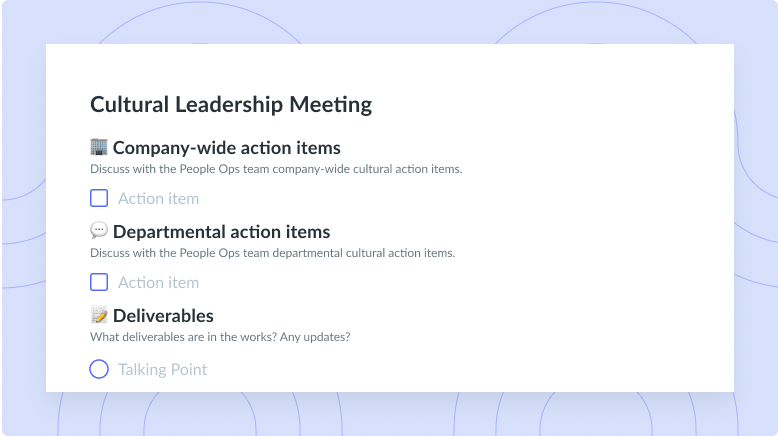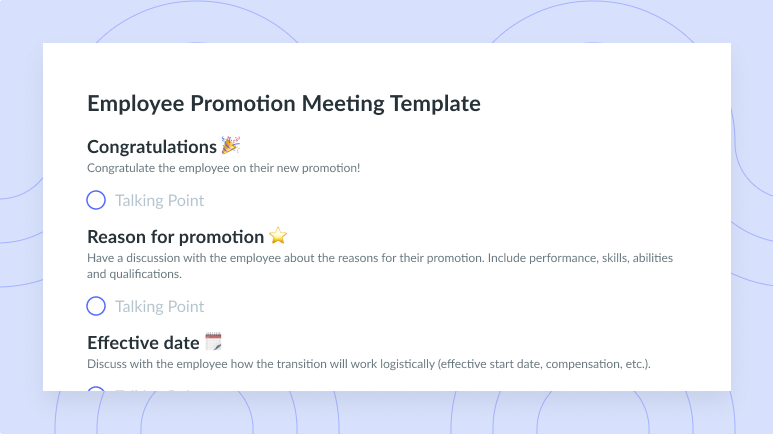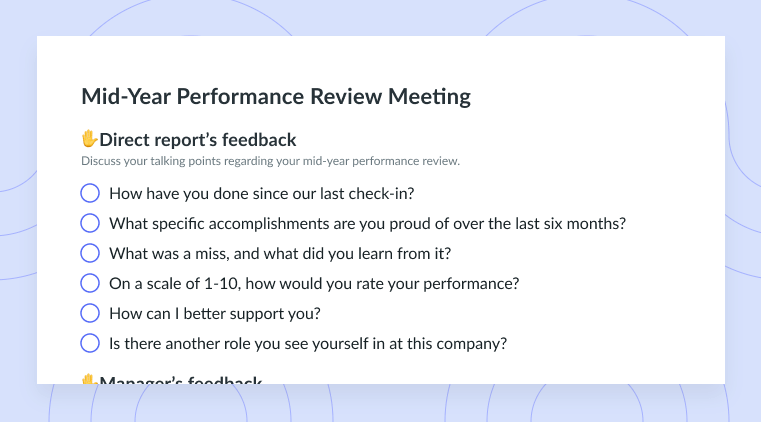A Manager’s Guide to Becoming a Better Coach
If you’re a manager looking to become a better coach, implement these 10 ways to instill a coaching mindset with your team.
In many industries, teams that are led by a manager with a coaching mindset have a leg up on the rest.
Every manager has opportunities to incorporate a level of coaching into their relationships, but it takes a specific skill set to get it right. When done correctly, coaching your team will unlock new potential in your team members, helping everyone accomplish a new level of success.
If you’re a manager looking to become a better coach, Fellow breaks down the steps to becoming a great coach below!
- The role of a coach and manager
- What are manager coaching skills?
- Why managers need to coach
- 10 ways to be a better coach as a manager
The role of a coach and manager
A coach as a manager is a specific role that an individual can have. An effective coach as a manager asks thought-provoking questions instead of just handing over the answers, supports employees without being quick to judge, and promotes the development of their employees. An individual who is both a coach and a manager will be focused on the growth of their team, have high emotional intelligence, and conduct effective one-on-ones that focus on performance and productivity.

Managing a team?
Take control of your team meetings by having collaborative meeting notes and encouraging accountability with action items. Try a tool like Fellow!

What are manager coaching skills?
A manager can become a good coach when they have specific skills in their arsenal. Some of these skills include:
- Active listening: The ability to listen attentively and thoroughly understand what another person is saying. This comes in handy during team meetings and 1:1s. This skill can be practiced by asking thoughtful questions and investing in the thoughts and opinions of your employees.
- Empathy: The ability to understand another person’s feelings. A manager can become a better coach by using empathy to build stronger relationships with their team, which allows them to better relate to others and understand their team members’ wants and needs.
- Adaptability: The ability to accept and manage change. Plans and strategies can change on a dime, and being adaptable will allow managers to accept new challenges and solve problems as they happen.
- Feedback skills: Managers striving to be coaches can use effective feedback skills to assist their team members in reaching new goals. A big part of this is knowing how to give constructive feedback positively so direct reports can feel inspired to improve and grow.
- Goal-setting skills: Effective goal-setting skills can help managers coach their employees to reach particular objectives. In addition to creating goals for their entire team, managers can also use these skills to develop personal and unique goals for each team member.
- Problem-solving skills: When managers strive to create effective coaching plans and strategies for their teams, problem-solving skills come in handy. No matter what type of team you lead, chances are good a problem, challenge, or roadblock is bound to surface, and knowing how to approach it to find a solution is always appreciated.
Why managers need to coach
There’s being a so-so manager, and then there’s being a manager that your team appreciates and respects. The latter is a manager who is also a coach.
Managers need to coach if they want to take their teams to the next level, motivate their teams through expert guidance, train direct reports for new positions, and inspire them to reach either a performance goal or an approaching deadline.
Managers who also coach ensure everyone on their team feels supported, empowered, and encouraged to do their best work. Honing in on your coaching skills as a manager will also lead to a boost in team morale and productivity.
10 ways to be a better coach as a manager
If you’re a manager looking to be a better coach, consider implementing these 10 steps! Doing so will take you from being an okay manager to being a great manager.
- Ask good questions
- Practice active listening
- Tailor your approach to each individual
- Show empathy
- Give and receive feedback
- Empower them
- Increase your emotional intelligence
- Be a sounding board
- Create accountability
- Be available
1Ask good questions
Whether you’re leading team meetings or one-on-ones, be sure to ask thoughtful, curious, and productive questions.
The next time you’re in a 1:1, consider asking these questions:
- What can I help you do?
- Do you have all the tools you need for this role?
- What are you currently excited about?
- Is there anything you’re currently struggling with?
- What’s your preferred method of communication?
- What are some of your personal goals this year?
- What would you like to spend more/less time on?
- On a scale of 1–10, how happy are you at work? What can I do to get you to a 10?
2Practice active listening
Active listening is so important that we mention it twice!
Practicing active listening is crucial to becoming a better coach as a manager. To improve your active listening skills, ask open-ended questions and give your direct reports verbal affirmations. Some open-ended questions you can ask are, “What can I do to help?” and “What would make your job easier?” You can also practice verbal affirmations like, “I’ve been really impressed with your work this quarter” and “Thank you for sharing your concerns. Let me think more on this and get back to you.”
And remember, you always want to listen before responding and gather as much information as possible when deciding if this is a situation where you should act as a manager or a coach. You need to have the full details of your employees’ concerns and problems, which all starts with listening actively as they share with you.
3Tailor your approach to each individual
If you’re a manager of more than one employee, then it’s best to tailor your approach to coaching to each of your direct reports. For example, you may have employees who prefer written communication over face-to-face and vice versa. Consider preferences, strengths, and weaknesses as you coach your team.
4Show empathy
Another point we want to hammer home one more time is how necessary it is to show empathy. Having empathy as a manager is crucial to becoming a better coach and building stronger relationships with your team. Being empathetic can help you relate to others and understand them as individuals, which will be useful when your employees turn to you with challenges, come to you with questions, or need your advice or input.
5Give and receive feedback
Giving feedback—both when things are going well and when times are challenging—is one of the most important responsibilities of a manager, and how you go about giving feedback will also set you apart as a coach.
The best feedback is timely, especially if it details ways an individual can improve. Consider giving this feedback during a team meeting if it’s praise for the individual’s hard work or dedication. If it’s constructive criticism, always give this feedback in private.
When receiving feedback, make sure to ask for it often. Normalizing input and building a culture of continuous improvement will provide insights into how you can better coach each of your direct reports, while also building trust and showing them you care about their input.

6Empower them
Just because you’re their manager and are striving to be a better coach doesn’t mean you can’t also be your employee’s number one fan! By showing your team members that you trust them and giving them projects that play to their strengths and that they’re interested in working on, you’ll empower them to build their skills.
Building their skills and finding new strengths will set your team members up for long-term success and uncover additional ways they can advance their careers.
7Increase your emotional intelligence
Emotional intelligence is how you use, understand, and manage your emotions as you solve problems, relieve stress, and communicate with others. Someone who is emotionally intelligent can pinpoint what others are feeling, how their emotions affect others on the team, and what their emotions mean.
Increasing your emotional intelligence will make you a better coach and leader for your team by helping you to improve your communication skills, build stronger relationships with your team, increase productivity, and improve team engagement. Also, having emotional intelligence will help you better manage your emotions and stress levels.
8Be a sounding board
Your team members likely come to you with questions, concerns, and challenges often. To improve your coaching skills, it’s important to be a sounding board for your team. This means don’t just hand over the answers, but instead, guide your direct reports to solving problems themselves. If the answers are within their reach and they can solve the problem independently, help them throughout the process instead of handing over the answers by telling them what to do. A great coach offers their team independence and trusts them to come up with a solution.
9Create accountability
Next, create accountability amongst your team. As a coach, when an employee has a task or project on their plate, it’s your responsibility to create a timeline, assign tasks with due dates, and follow up. Thankfully, Fellow can help coaches nail this by helping you organize action items, notes, and deadlines for your team members to access at any time.
With Fellow, it’s easy to assign, visualize, and prioritize all your meeting to-dos in one place. Not only does this ensure nothing falls through the cracks, but you can see when things are slipping and when more guidance may be necessary.
10Be available
Finally, a good coach is available to their team when they need it most. Whether by answering questions, guiding team members through challenges, or assisting with deadlines, you should do your best to be available when your team needs you. It can also be helpful to both you and your team if you set up office hours, which will encourage a safe space for your direct reports to come to you when help is needed. Be sure to document conversations that occur during office hours in Fellow.
There’s no “I” in team
No matter the size of your team or if you’re a manager or team leader, establishing a coaching mindset will help you help your employees move toward being their most successful and productive selves.





![How to Successfully Manage Someone Older Than You [& What to Avoid]](https://fellow.app/wp-content/uploads/2022/01/managing-someone-older.jpg)



